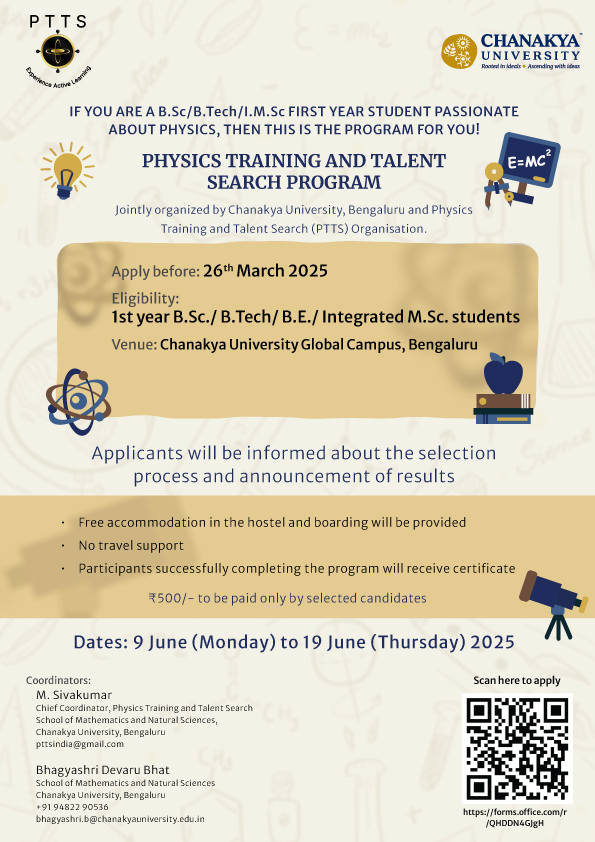Physics Training and Talent Search (PTTS) is a training program designed to nurture motivated undergraduate and postgraduate students, as well as teachers, through active learning methodologies. Our goal is to identify talented individuals and provide them with the skills, guidance, and exposure needed to pursue research careers in physics or excel in teaching roles.
Since its inception in 2015, PTTS has successfully conducted flagship programs, mini-programs, and teacher training workshops, despite interruptions in 2020 and limited funding in 2023–24. The program's unique methods aim to transform participants' approach to learning and teaching physics, benefiting their academic and professional journeys.
India's educational landscape is at a pivotal moment. While there are islands of excellence at the school and university levels, there remains a critical need to empower students and teachers in under-resourced institutions, particularly in rural areas. PTTS aims to bridge this gap by offering training programs that focus on critical thinking, collaborative problem-solving, and experimental physics.
We focus on higher education as it directly influences the quality of school teachers, researchers, and professionals who shape the nation's future. Our programs target college and university students, fostering intellectual growth at a stage where it can have the most significant impact.
Our teaching approach emphasizes 'learning how to learn' rather than rote memorization. For theory, we employ interactive, question-driven lectures, while tutorials foster peer collaboration. The experimental physics course challenges students to think like experimentalists—proposing, designing, and executing experiments using limited resources.
This methodology has consistently received positive feedback from participants, who report significant improvements in their understanding, problem-solving abilities, and confidence in pursuing academic or research careers.
Since 2015, PTTS has mentored students and teachers from diverse backgrounds, many of whom are now pursuing research or teaching careers in premier institutions across India and abroad. Alumni feedback highlights the program’s role in their academic growth and career trajectory.
We gratefully acknowledge support from organizations like the Infosys Science Foundation, IISER Pune, and ICTS Bengaluru, among others. Institutions interested in partnering with PTTS to host programs or fund initiatives are encouraged to contact us. These collaborations can serve as part of Corporate Social Responsibility (CSR) or Scientific Social Responsibility (SSR) activities.
For inquiries or partnerships, please reach out:
The first programme was held from December 18 to 30, 2015, at Kuvempu University, Karnataka, for around 50 B.Sc. III-year students selected from across India. This highly successful programme was funded by several research institutes and national science academies, motivating us to continue it annually. Since then, multiple programmes have been conducted at different venues.
To provide a platform for motivated students to interact with peers and experts in the field.
To identify talented students and nurture their talent for a research career in Physics.
During the class:
Pause, by asking students for suggestions as to how to proceed further, giving hints if needed. Ask simple questions to check if they understood what was said.
WE DO NOT COMPROMISE ON THIS ASPECT.
NO LECTURING FOR THE FULL DURATION WITHOUT INTERACTION WITH STUDENTS AT REGULAR INTERVALS
The following has to be emphasized in the course of lectures:
answer “why, why not” kind of questions at every stage.If they dont, you ask them such questions.
e)We would like the teacher and tutor to attend the other courses at the same level. Coordinators will also be attending the classes.
We encourage any teacher attending the class to ask a potential good question which you expect a student must ask. Students must observe a mature question asked and learn to ask such questions in future.
SUGGESTIONS ABOUT THE ORGANIZATION OF LECTURES
See if it can be reversed it by working simple examples and then making students see the general result for themselves? This should give them a thrill of discovery.
Critical questions: Something new is taught, how does it agree/not agree with what is already known?
Creative questions: If some result is shown in a given situation, envisage a different situation or add some complication and ask how the result is modified?
Such questions can be prepared when preparing the course. Feynman lectures has such approach.
TUTORIALS
Tutorial problems can have the following components, wherever possible:
Problems can be of increasing difficulty.
In tutorials , participants will be asked formed in groups. Once problem sheet is given, they will be asked to discuss among themselves as to how to start the problem.
They should not jump to start writing without discussing. Each group has to be check with the tutors, if their approach is correct. Tutors will be more facilitators to help them come with their solution.
Example: Show experimentally a)Force is a vector, b) does diffraction depend on the state of polarization.?
Example: Find a method of measuring the instantaneous velocity of a moving object. Can involve circuits, which they can come up with.
2) Also it can be a problem posed to have a controlled study and there should be scope for student to give qualitative theory to explain what they find.
Example: Measure damping constant of a damped oscillator as a function of temperature/concentration /pressure and find the behavior. Explain why such a behavior is seen.
Measure terminal velocity of any object and investigate how it depends on temperature/pressure/density of liquid. Give a theory to explain.
.
very minimal equipment, students will have to fabricate their own equipment. The
budget constraint of Rs. 200 per student forces them to be innovative.
We sometimes give only empty room/empty lab .
measurement process 2) identify sources of error due to mismatch between theoretical
idealization and experimental conditions.
There should a lecture on error analysis on the first few days

PTTS -2015 at Kuvempu University
PTTS 2016 at Regional Institute of education
PTTS-2017 Loyola College
PTTS-2018 National Institute of technology , Surathkal
PTTS-2019 Manipal Institute of Technology, Udipi
PTTS-2020 Cancelled due to the pandemic
PTTS-2021 Ahmedabad University(online
How to Apply